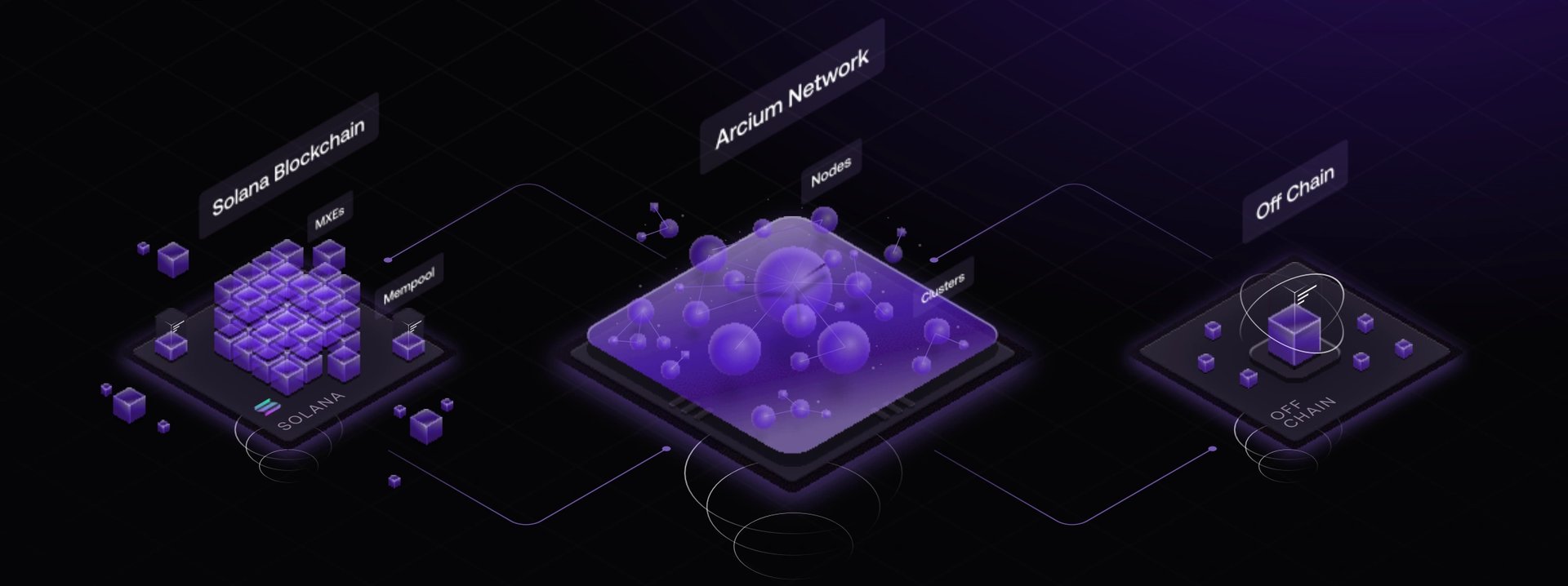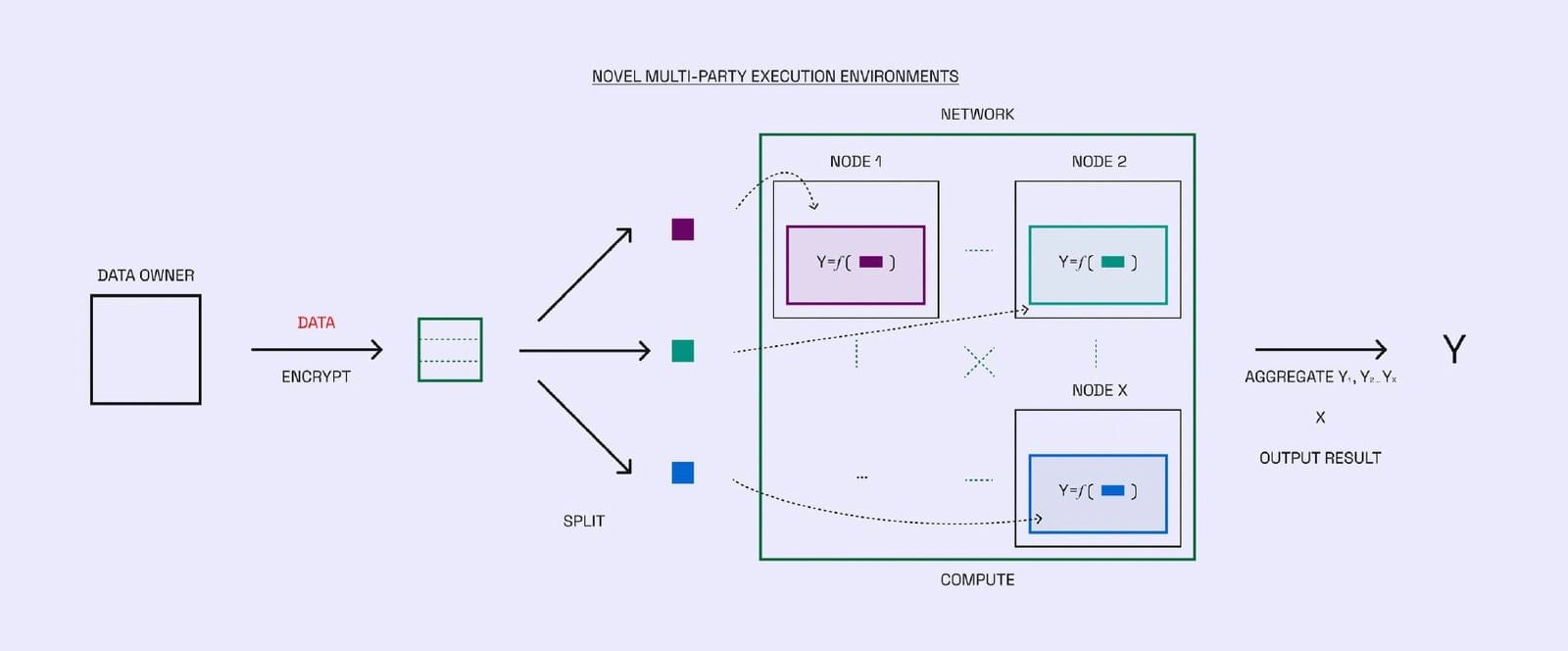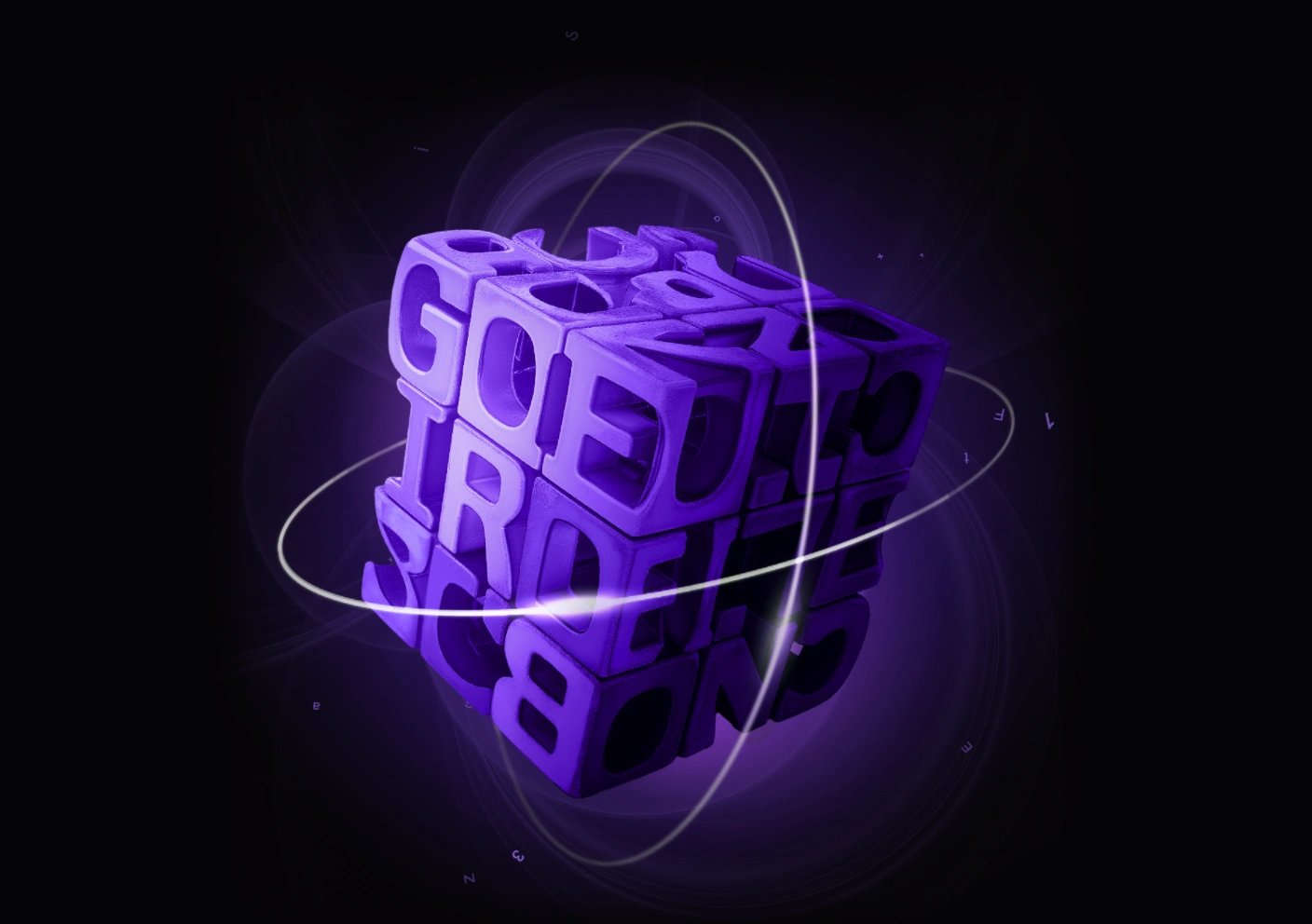订阅 wiki
Share wiki
Bookmark
Arcium
0%
Arcium
Arcium 是一个去中心化网络,旨在支持加密计算,专注于为链上应用程序提供隐私,并为开发者提供可验证、无需信任的框架。[1][2]
概述
Arcium 由 Yannik Schrade、Julian Deschler、Nicolas Schapeler 和 Lukas Steiner 于 2022 年创立,旨在提供一个去中心化的机密计算网络。最初名为 Elusiv,它在 Solana 区块链上运行零知识隐私协议,并通过两轮融资获得了 900 万美元的资金,其中包括由 Greenfield Capital 领投的战略轮融资。
2024 年 5 月,Arcium 推出了其激励性私人测试网,作为其路线图的一部分。该网络专为 区块链、医疗保健和人工智能等领域中的安全数据协作而设计,使用分布式节点架构来执行多方计算 (MPC) 任务,同时保持数据加密。
Arcium 在 Solana 区块链上的框架处理诸如计算调度和补偿之类的任务。它旨在提供灵活的 MPC 配置,允许用户为人工智能模型训练和机密数据分析等应用程序定制安全和执行协议。[1][2][3][4][5]

架构
Arcium 的架构旨在支持分布式机密计算。它将任务分解为计算定义,这些定义在 Arx 节点的集群上的多方计算 (MPC) 环境 (MXE) 中执行,其功能类似于安全处理的硬件。
该网络由在 Solana 区块链上运行的程序协调,旨在通过链上内存池系统管理任务。计算服务的补偿在链上处理,从而促进从客户到 Arx 运营商和第三方委托人的付款。[6]

产品
多方执行环境 (MXE)
多方执行环境 (MXE) 旨在促进对加密数据的安全计算,从而使多个参与方能够在不泄露其输入或输出的情况下进行协作。开发人员可以根据数据的敏感性自定义加密模式,从而为参与节点生成共享密钥。
MXE 是 Arcium 网络的基本组成部分,可以分为单次使用(在丢弃之前执行一次计算)或持久性(允许重复使用)。节点集群确认其处理任务的能力,执行必要的预处理,并从 区块链 检索输入以进行并发处理。该网络支持各种 MPC 协议,包括 BDOZ,以提高效率和安全性。[5][7][8][9][10][11][12]
集群
集群被设计为 Arx 节点的组,旨在利用多方计算 (MPC) 进行机密操作。客户可以根据各种节点属性(包括声誉和计算能力)形成集群。
在创建集群期间,客户指定参数,例如最大负载和启用可信执行环境 (TEE) 的节点数。大多数属性是固定的,但潜在的负载增加除外。
节点必须同意加入集群。在非许可集群中,会添加一个随机选择的节点,并且激活需要所有节点的批准。维护节点优先级列表以用于备份节点。
集群通过分布式密钥生成 (DKG) 管理加密密钥操作,并且可以采用 TEE 来增强机密性。如果 MXE 被弹出,集群分叉使剩余节点能够执行单独的计算。
迁移成本在节点之间分摊,并且必须传达关闭意图以防止受到处罚。奖励根据权益委托进行分配,领导者节点收集输出份额以获得额外补偿。许可集群使组织能够监督其节点基础设施。[13][14][15][16][17][18][19][20][21][22]
Arx 节点
Arx 节点充当 Arcium 网络的基本组成部分,旨在促进复杂任务的分布式计算。每个节点保留一个加密的数据片段,并采用多方计算 (MPC) 协议来增强数据隐私。
节点与节点运营商相关联,节点运营商可以管理多个节点。相关元数据包括节点的 IP、端口和管辖区代码。Arx 节点还安全地管理密钥份额,并且可以利用可信执行环境 (TEE) 来加强安全性。
节点运营商通过自我委托和来自第三方委托的费用来产生收入。声誉根据历史表现进行评估,该网络目前支持 BDOZ MPC 协议,并计划在未来扩展协议。
中间层节点旨在将链下数据连接到计算,这需要用户的信任。可靠的基础设施对于节点运行至关重要,并且对 TEE 的支持可能会增加潜在的收入机会。[5][23][24][25][26][27][28][29][30][31][32]
计算
Arcium 网络区分系统计算和正常计算。系统计算旨在支持网络运营,包括用于分布式密钥生成的 DKGSystemComputation、用于集群迁移的 MigrationSystemComputation 以及旨在在检测到不参与时触发更广泛共识的 NonParticipationDetectionSystemComputation。
正常计算是指与 MXE 关联的客户发起的任务,这些任务在计算定义中定义,计算定义指定输出和执行权限级别。执行逻辑利用基于 BDOZ 协议的公共或私有电路来实现高效的加密操作。客户负责设置数据源的参数,同时保持数据完整性和机密性。确定性定价模型有助于成本预评估,并允许通过额外费用来提高优先级,节点运营商投票以建立可持续的定价。[33][34][35][36][37][38][39][40]
去中心化机密计算 (DeCC)
去中心化机密计算 (DeCC) 旨在确保敏感数据的安全处理,而不会暴露数据。它将去中心化(将数据分布在多个位置)与机密性措施相结合,以防止未经授权的访问。这种方法解决了对数据隐私日益增长的担忧,同时促进了 Web3 生态系统中的安全处理。
DeCC 利用多方计算 (MPC)、零知识证明 (ZKP)、全同态加密 (FHE) 和可信执行环境 (TEE) 等技术来在处理过程中保持数据隐私。Arcium 框架应用这些 DeCC 原则来创建加密计算的结构,旨在通过防止任何单个实体完全访问完整数据集来降低数据泄露的风险。[45]

Cerberus
Cerberus 是 Arcium 开发的用于安全多方计算 (MPC) 的加密协议。它建立在 BDOZ MPC 协议之上,并在不诚实多数的假设下运行,因此每次计算只需要信任一名诚实的参与者。
该协议旨在通过可识别的中止和不经意的传输来纳入问责机制,以实现无需信任的预处理。它允许通过基于加密证明的 质押 和削减系统来识别和惩罚网络中的恶意行为者。[44]
生态系统
Solana 集成
Arcium 利用 Solana,这是一种开源 区块链,可促进 去中心化应用程序 和交易。Solana 上的链上程序负责管理 Arcium 网络,其中包括 Arx 节点的注册、计算处理以及付款和奖励等财务活动。
该网络实施双内存池结构:用于准备执行的计算的活动内存池和用于等待其他计算完成的依赖内存池。这种设计旨在通过将计算定向到 Arx 节点集群来改进组织。虽然最初与 Solana 集成,但 Arcium 旨在未来支持多个 区块链。[5][41][42][43]

用例
Arcium 的机密计算网络旨在增强各个领域的数据安全和隐私。主要用例包括:
- 人工智能:旨在促进加密数据的安全池化,以进行协作式人工智能训练,同时保护各个数据集的隐私。
- 去中心化金融 (DeFi):旨在加密 DeFi 操作并扩展到 现实世界资产 (RWA),以促进合规性并保护用户数据。
- 去中心化物理基础设施网络 (DePIN):旨在确保安全处理去中心化服务中的敏感数据,而不会暴露数据。
- 医疗保健:旨在安全协作处理敏感患者数据,从而促进个性化医疗的分析,同时保护隐私。[5][44]
发现错误了吗?
